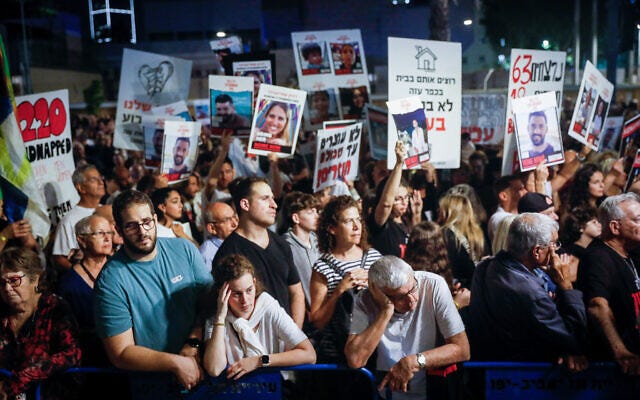Time's Uncertain Wing
Last week, Israel and Hamas agreed to put a “pause” on the war. This week, life had none of that word’s smooth sonic texture. It was a scraggy, rutty bunch of days, glutted with disgust and dismay.
Each evening, we gathered around our TV’s to watch the drama of the hostage crisis unfold in real time. We waited for hours for a glimpse of each toddler, child, mother, or grandmother who had been ripped from his or her family and held captive in the Hamas tunnels of Gaza for the last two months. We knew them all by name, by their nightmarish stories. Like parents of teenagers out past curfew, we could not sleep until we saw, with our own eyes, that each of them was home.

First, the news anchor presented the facts—the number of hostages scheduled to be released that evening, the route they would take from Gaza to Israel, the Israeli hospitals at which they would be treated. Next, she outlined the agreements Israel and Hamas had reached that day, cautiously withholding the names of those due to be released.
No sooner had we set our expectations at a minimum (each night just 10 of the 240 hostages were supposed to be released), than Hamas upended them. They “were revising the release list.” They “couldn’t release a mother with her children [a key term of the deal], because she had been kidnapped by a fringe terror group, which was holding her at an undisclosed location.” “Yes,” they would be returning ten hostages this evening, but—by the way, we forgot to mention earlier—“three of them will be dead.”
Their despicable manipulations and cruel calculations hit their target—us, the anxious Israeli public—with stunning effectiveness. Would the evening’s hostage release go forward? Could the Qataris, Egyptians, and Americans—the unlikely team working on our behalf—succeed in pressuring Hamas to stick to the deal? If the hostages weren’t returned by midnight, would we revert to war? Would our boys be back fighting on the front in the morning?
Then came the bizarre images from Egypt, obtained by Israeli media from the Al Jazeera and Al Arabiya networks. Dozens of doctors and nurses stood at attention opposite a fleet of gleaming Red Crescent ambulances in the hospital parking lot at which the hostages were scheduled to arrive. Hamas terrorists, shrouded in black masks and camouflage, and strapped with machine guns, assisted the hostages—mostly children—into Red Cross vans, as if accompanying them on a school field trip. The final, disquieting scenes from Egypt were of mobs of young men encircling the vans and climbing on their roofs.
Though by now the waiting was excruciating, we had another step to endure—the news blackout that hit each night when the Red Cross vans traveling from Egypt to Israel were beyond the cameramen’s reach. A team of political pundits filled the void with predictions and conjectures that only increased the weight of the waiting.
Finally, the news anchor informed us that the vans had been spotted crossing the border into Israel. Grainy, black-and-white security camera footage confirmed it. “The hostages are home,” she announced, with visible relief. Soon, we would see the first images of the flag-waving crowds welcoming the hostages back to Israel. The black-and-white had turned blue-and-white.
The hostages’ names could now be released. Their photos flashed across our screens. The news commentators shared the details of their stories. From the hotel lobbies that have become living rooms for thousands of people whose homes were destroyed by Hamas on October 7, aunts and uncles, grandparents, and friends described the newly freed hostages’ personalities, their hobbies, the first things they hoped to do with them when they were finally reunited.
One night of waiting was over, though we would undergo the ordeal again the next night, and the next, and the next. For the sake of the 145 hostages still being held in Gaza, their families, and all the people of Israel, we can only hope, like Emily Dickinson, that love will overcome the uncertainty, anxiety, and dread of waiting.
If you were coming in the fall
By Emily Dickinson
If you were coming in the fall,
I’d brush the summer by
With half a smile and half a spurn,
As housewives do a fly.If I could see you in a year,
I’d wind the months in balls,
And put them each in separate drawers,
Until their time befalls.If only centuries delayed,
I’d count them on my hand,
Subtracting till my fingers dropped
Into Van Diemens land.If certain, when this life was out,
That yours and mine should be,
I’d toss it yonder like a rind,
And taste eternity.But now, all ignorant of the length
Of time’s uncertain wing,
It goads me, like the goblin bee,
That will not state its sting.



